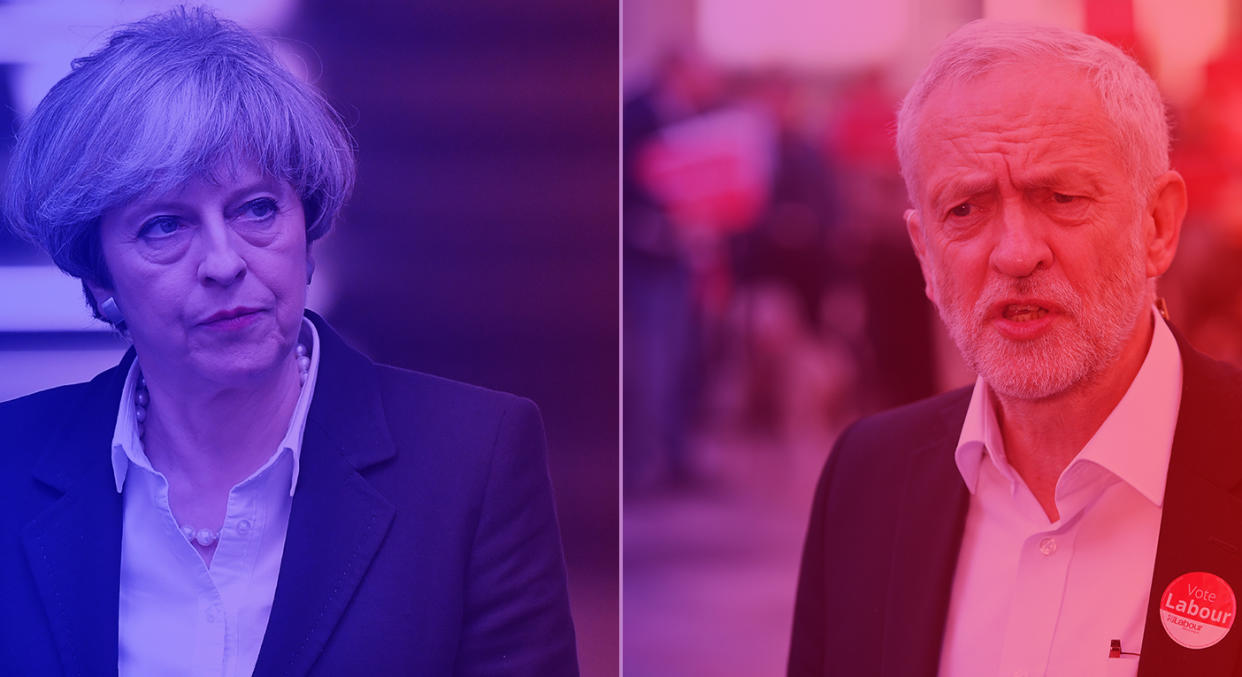The five issues that will decide the general election - and what the two main parties say about them

The NHS is the issue that is most important to voters, a poll has found, with 17.8% of voters citing the health service as the issue that matters most to them.
Brexit was the second most important issue for 12% of those surveyed, followed by immigration in third place on 8.2% and then the economy on 8.1%.
The fifth most important issue to voters was the leader of each political party.
The Survation poll carried out for Good Morning Britain asked a cross-section of the public about the things most likely to sway their vote.
Crime turned out to be the least significant issue to the voting population, with just 0.1% saying this was most important to them.
GENERAL ELECTION ’17: LATEST NEWS AND POLITICAL ANALYSIS FROM YAHOO UK
Three times leaders called snap elections – and it backfired.
Theresa May has revealed ‘the naughtiest thing she’s ever done’
Jeremy Corbyn could become the first bearded prime minister in a century
Corbyn ‘must win or go’ say Labour figures plotting leadership rules change
MPs themselves are also surprisingly unlikely to sway voters’ hands – only 0.5% of people think their local candidate is an important factor in deciding where they cast their ballot.
This is where the two main parties stand on voters’ top issues.
The NHS
The Conservatives have pledged to increase NHS spending by a minimum of £8billion in real terms over the course of the next five years.
The party’s social care pledges have been some of the most controversial of the election campaign. The manifesto promised to include the value of a person’s home in a means test to decide whether they will pay for their own social care at home. The final bill can be deferred until after a person’s death, and a cap on costs was announced after the manifesto launch.
Labour is promising an extra £30billion in funding for the NHS over the next five years. In addition Jeremy Corbyn has said he would reverse the privatisation of healthcare and guarantee access to NHS treatment within 18 weeks. He is also pledging to reduce A&E waiting times to a maximum of four hours. The party promises to put an extra £8billion of funding into social care by 2022.
Brexit
The Conservatives promise that the UK will leave the EU single market after Brexit. They also intend to pass a Great Repeal Bill to convert current EU laws into UK laws. The rest of the party’s pledges are rather less specific – they have promised a ‘smooth and orderly’ Brexit resulting in a ‘deep and special partnership’ with the EU.
Labour would bin the Tories’ Brexit White Paper and redraw Britain’s negotiating priorities with a stronger focus on the single market and customs union. They would also scrap the Great Repeal Bill and replace it with a bill ensuring the rights of workers and environmental protections. Labour would guarantee the rights of all EU citizens currently living in the UK (a negotiating priority for the EU). Jeremy Corbyn has also promised that he would not allow Britain to leave the EU without a deal in place.
Immigration
Labour has said that freedom of movement will end after Brexit. The party would not count students in immigration numbers, and promises an additional 500 border guards.
The Tories have renewed their failed 2015 pledge to reduce immigration to the tens of thousands. They also plan to double the charges currently paid by companies employing migrants, and will raise the minimum earnings level for family visa sponsorship.
The economy
Labour wants to bring in a £250billion economic stimulus package. They have promised not to increase National Insurance or VAT, and would introduce a 50p tax rate for those earning over £80,000. The party also wants to increase corporation tax to 26% in three years.
The Conservative manifesto promises a balanced budget by 2025. They also pledge not to increase VAT. They would however cut corporation tax and raise the personal tax allowance.
Party leaders

The Conservative party has pinned much of its campaign activity to its leader Theresa May, banking on her popularity as a leader. But her support has slipped significantly over the course of the campaign. When she called the election in April, 54% of the public thought she would make the best Prime Minister. This has now dropped to a low of 43%
Jeremy Corbyn’s support on the other hand has increased markedly. Two months ago just 15% of voters thought he would make the best Prime Minister. But the day before the election this has doubled to 30%.

 Yahoo News
Yahoo News 


